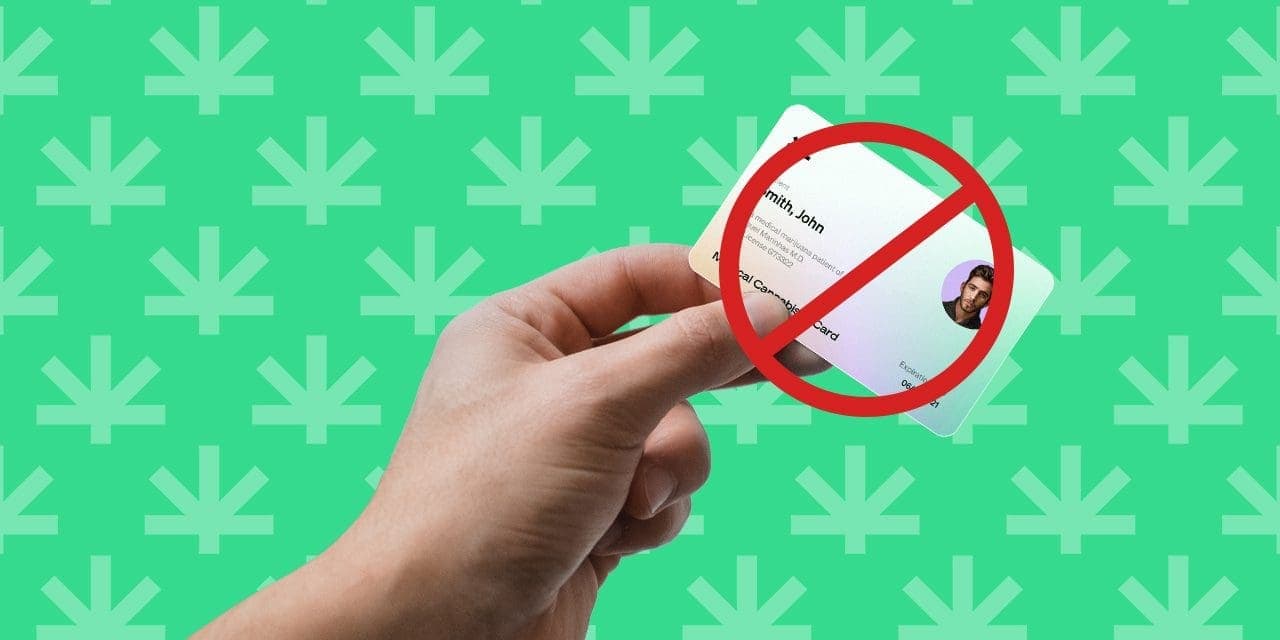Why might you get denied for a medical cannabis card?

Article written by

Olivia SwannWriter & Digital Marketing Specialist
Content reviewed by

Zachary Levin JDIn-House Counsel
Many people can apply for their state’s medical cannabis program, but approval is not automatic.
To be approved for a medical card, you must meet state-specific qualifications, which include getting a doctor’s recommendation for medical cannabis use and filling out an application. If you don’t follow the right steps, your application may be denied.
Here are the most common reasons you may be turned down for a medical cannabis card — plus, what to do if it happens.
1. You’re not diagnosed with one of your state’s qualifying conditions
Each state has its own list of health conditions that qualify for medical cannabis use.
If you don’t have a diagnosis that’s on your state’s list, a doctor cannot legally provide a recommendation for a medical cannabis card.
Tip: Check your state’s medical marijuana program website or use Leafwell’s state-by-state guide to confirm eligibility before applying.
2. You have a condition that disqualifies you from cannabis use
Some providers may decline to issue a recommendation if they believe cannabis use could create significant health risks. They might do so for patients with certain heart conditions or untreated psychiatric disorders, for example.
A doctor might deny your request for a cannabis recommendation if they believe cannabis could worsen your physical health or mental well-being.
Tip: Be upfront about your full medical history so your provider can make a safe, informed decision.
3. You’re pregnant or breastfeeding
Most healthcare providers will not make a cannabis recommendation for people who are pregnant or nursing due to potential risks of cannabis use during pregnancy and limited safety data.
Some state programs explicitly caution against medical cannabis use during pregnancy or breastfeeding. This is due to possible risks to fetal and infant development.
Even if you meet other qualifying criteria, pregnancy or breastfeeding can be disqualifying factors.
Tip: If you’re trying to conceive, talk with your doctor about your cannabis use to weigh risks and explore safer alternatives during pregnancy.
4. The doctor did not find a medical need for cannabis treatment
Even if you have a qualifying health condition, you’ll need to show how cannabis could benefit you. If your symptoms are mild or already well managed with other treatments, a doctor might decide medical cannabis isn’t necessary.
Tip: Bring any related documentation, like medical records, prescriptions, or symptom logs, to your cannabis recommendation appointment to support your case.
5. You have a documented history of substance use problems
If you have a record of substance use disorder — especially involving cannabis misuse — a provider may hesitate to make a medical cannabis recommendation.
While a history of substance use disorder may influence a provider’s decision, and some state programs impose additional restrictions related to past drug convictions, this varies widely by state and jurisdiction.
Tip: Be prepared to discuss your history honestly and show proof of treatment or recovery progress, if applicable.
6. The forms weren’t submitted correctly
Administrative errors can lead to denial — even if you otherwise qualify for medical use.
Filing an application with incomplete forms, missing signatures, or expired identification are common reasons for rejection.
Tip: Double-check all paperwork and consider using a telehealth service like Leafwell to help streamline the process.
7. You need a parent or guardian to sign off
If you’re a minor, most states require written consent from a parent or legal guardian to use medical cannabis. Without it, your application won’t be approved, even if you have a qualifying condition.
Tip: Talk with your parent or guardian ahead of time about why you believe cannabis could help and share supporting information from a trusted source.
8. You have a disqualifying criminal record
Certain states restrict medical card applications from individuals with specific felony convictions, often drug- or violence-related.
Other states impose no such restrictions. Some restrict only individuals who are currently incarcerated, on probation, or on parole.
Tip: Review your state’s specific rules about criminal history and medical cannabis use. In some cases, you may be eligible to apply after a waiting period or if your record has been expunged.
How hard is it to get a medical card?
Generally speaking, getting a medical cannabis card is a relatively straightforward process, as long as you meet the state’s eligibility requirements and have proper documentation. When that happens, approval rates are typically high.
What to do if you’re denied
Being denied for a medical cannabis card doesn’t mean it’s the end of the road. You can:
- Seek a second opinion from a different provider for a cannabis recommendation.
- Gather more documentation about your condition and symptoms and how medical cannabis may help.
- Reapply for your medical card after resolving any application errors.
- Explore other options with your doctor if medical cannabis isn’t an option.
Frequently asked questions
Find answers to common questions about getting denied for a medical marijuana card.


